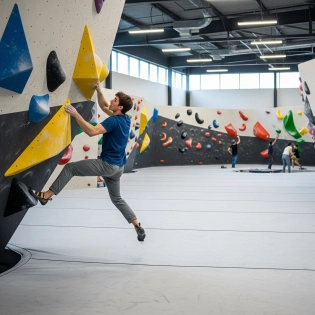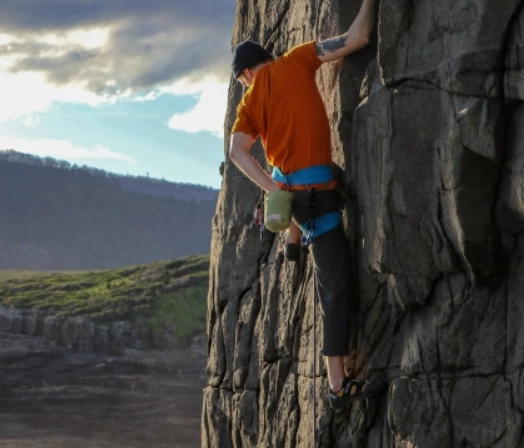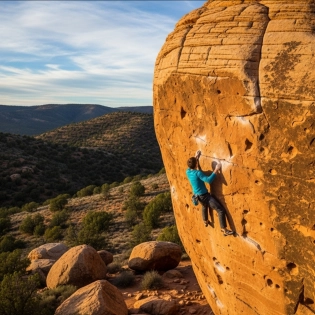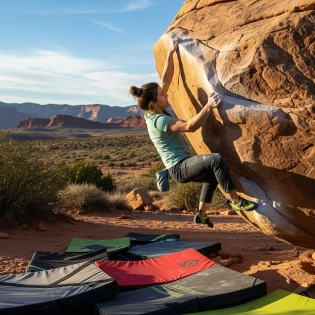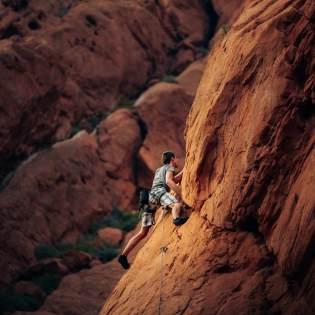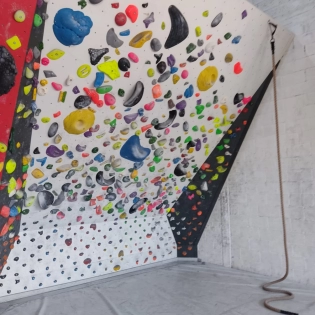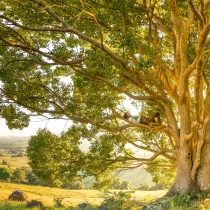

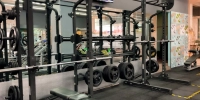
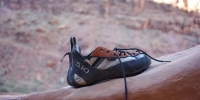




Climbers Point
Beginner here but I have been doing that for a few month, I don't know if it's ok or not though. I come from a weight lifting background, so to me it just comes natural to lift weight, it's the climbing part that is new for me, and in order to not be in the gym everyday I have been combining sessions. I haven't found what works best yet though as it's pretty random what I do first, either weight lift and then climb or climb and then weight lift.
I haven't gotten injured yet, but that might be because I have been physically active for years now. I would assume that if it's someone who has not been physically active and that climbing is the among the first and only physical activity they do, that they should be more cautious about weight lifting and climbing in the same day and take it slowly.
I just learned at the gym that this is actually an international way of encouraging or saying "you can do it". Pretty cool when the whole gym is yelling at you "alle" or "you can do it!".
I haven't gotten there yet, but I have come pretty close to doing one, but I think it was very much my "style" as it was a very physical boulder and I have been weight lifting for a few years and have some strength. I think I was just very much lacking the technique needed to actually do the boulder. If I would have done it though I don't know if I could have counted it as actually doing a real v6, since it might have been a very soft one and very much my style. I'm not sure that really counts.
I have taken a few breaks from climbing here and there, sometimes for a few months at a time, and each time my shoes felt more like plastic than I remembered. It's not to the point where it's a whole new break-in process, but, it usually takes about a session or two to get used to them again. It's really about getting my feet used to climbing shoes again, the shoes usually keep the shape they had before I took my break, it's my feet that need to re-adapt to the tightness of the shoes.
I have washed my chalk bag a few times throughout the years, not that it was REALLY needed, but, I personally like to refresh my gear after sometime. Other gear I might buy new, but chalk bags I feel can just live on until they are really in bad shape and ruined, especially because they are not a matter of safety. When it comes to safety or performance, like quick draws or shoes, I would buy new, but chalk bags don't fit those categories so I just keep them for as long as they last and give them a little wash if I want to "renew" them.
I've been climbing for a few years now and have never had to wash my chalk bag. What happened to yours? Did something spill on it? I can't imaging why one would need to be washed unless you are trying to sell it or it got into an accident and got spilled on!
Either way, I don't see why it would hurt to wash it by hand and let it dry out in the sun. I know that some chalk bags have different materials in them besides the fabric, so they may not all be good for the washing machine, but by hand I think is alright, but I have never had to do it before so I am not talking from experience!
I would add that it also depends on if it's indoor climbing or outdoor climbing. I don't climb indoors as much as I do outdoors, but usually when we go out we easily have full day sessions, leaving in the morning and getting back at night, sometimes the next morning even.
I doubt I would be able to have such long sessions in an indoor gym though. There is something about the outdoors that just makes it possible to have such long sessions. I think that for indoors my longest session has been about 3 hours.
Hope this helps!
As Joshua answered, you really dont need to downsize beginner shoes, because they are beginner shoes. Once you get past the beginner stage and get to the point where downsizing can actually contribute to your climbing, then its worth considering downsizing.
I wouldn't. Downsizing isn't really meant to be a beginner thing, it's really not beginner friendly. The whole point of downsizing is to have better control and performance for the more difficult and advanced routes, beginners don't climb on advance routes that require high performance shoes or downsizing.
I would hold off on downsizing and only do it when you get to the higher grades and are more knowledgeable in climbing and climbing shoes, it's a whole world out there!




Good cheer to all on this beautiful day!!!!!
Good luck :)

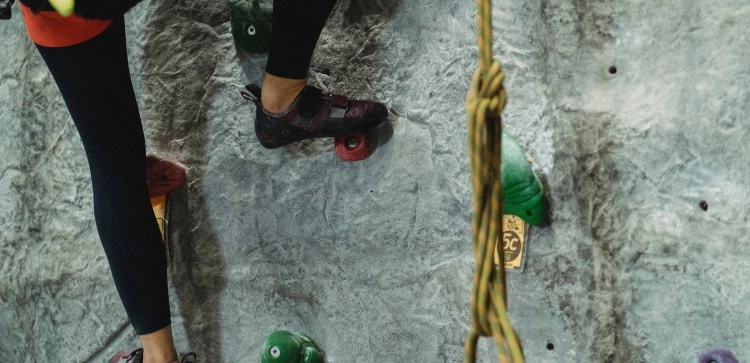


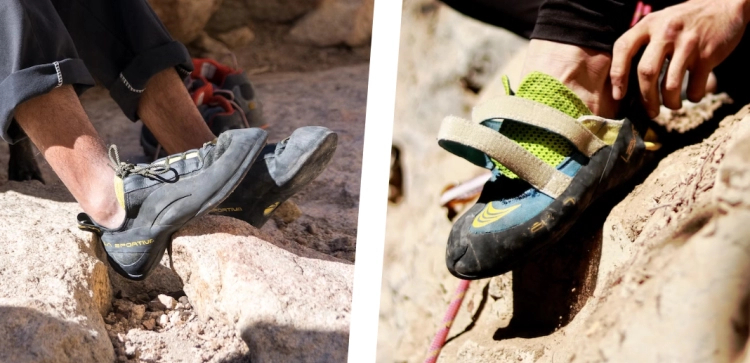
I don't have any lace climbing shoes, but so far I know quite a few people who have Velcro shoes that have torn and the Velcro strap is no longer attached. My shoes are actually very close to tearing it seems as well.
I have never seen anyone whose lace shoes have torn though, but I'm sure it happens, I just don't know at what rate compared to Velcro shoes.

There may be some brands that have similar sizing, most likely by chance, but overall brands can have very different sizing to their shoes. Even different shoes from the same brand tend to have different sizing.

I believe he said in one of his recent videos, or just in a video he was in, that he downsizes his shoes a few sizes less than he used to a few years ago. I can't remember the reason why he said he does it.

I would say you should always try them on and see what works for you. The same principles apply to choosing neutral climbing shoes as they do to choosing aggressive climbing shoes - try them on and feel what feels best for you.
I would keep in mind the intended usage of the shoes though, since if you are getting neutral shoes, you may be climbing longer routes such as in sport and trad climbing, in which case, downsizing to something very tight may feel very painful and uncomfortable due to wearing the shoes for so long.

For me the fit of climbing shoes has always been the same based on the shoes. I haven't changed my shoe size since I started climbing a few years ago, even when I try on shoes I already have, like the Evolv Shaman 2, I still find that the best fit is the same size I got when I first bought them a few years ago.
I don't really think there is a general best length. For me personally, I cut them just enough to not be too short, but don't leave enough to hear the nails on the wall. If they are even a little bit longer than that, they tend to sometimes get bent backwards while grabbing the holds, which obviously is not very pleasant.





























In my opinion, the problem is less about the actual hangboarding, and more about beginners not knowing when to stop and let their fingers rest. Since new climbers aren't usually used to the strain that climbing puts on their fingers and tendons, it's very easy to overtrain and to get injured.
This is true just by climbing alone. Add to that the element of hangboarding and you are in a very high risk of injury!
If a new climber can listen to their body, and also follow a strict program that will minimize the potential for finger injuries, even including hangboarding in the program could be fine. But, this will take a lot of self discipline that a lot of climbers don't seem to have.
Generally, I think that if you do things correctly, you could be fine doing finger specific training during your first year of climbing.



It for sure can if you wear the wrong shoes! It would also likely be a combination of other things such as wearing climbing shoes that are too small and landing badly, which could be bad regardless of the shoes, but wearing shoes that are not good for you would most likely increase the risk of bad landings.
Even without combining shoes and other factors, wearing climbing shoes that are not right for you, such as shoes that are too small, can cause damage by itself if you wear them for too long and if they are really too small.
Being well educated about how well sized climbing shoes should feel, mindful of if you got it wrong, and disciplined enough to listen to your body should help prevent damage to your feet though.
For me, after climbing for about a year, I noticed that my toes are more squished together, especially the tips of my toes. They have a sharper square shape rather than a round shape.
It sounds like either the shoes are not the right shape or fit, or there is a pressure point on your big toe. Or maybe you put too much weight on your big toe rather than spreading the weight across all of your toes?
Usually yes, but it should really be more of an uncomfortable feeling rather than actual pain. If you are used to climbing shoes, it may be fine, if not, you get used to it pretty quickly, assuming you didnt size down too much.
All of the boulders in my gym are actually around 2 grades below their given grade, I don't understand why they give them the higher grades and not the actual lower grades. Is there a reason for it?
I like training static and slow movements for climbing. I feel it translates the best to actual climbing.
I usually find a pull up bar and just do a lot of different grip width variations. Some narrow grip, some shoulder width, and some as wide as I can. All of them are done slowly and controlled, so I don't jerk myself up. I start from a complete dead hang position, slowly pull myself up, and even more slowly lower myself back down.
I also try to pull myself further up, so that I am in between a regular pull up and muscle up.
Training one arms is probably my favorite though, it also really requires very minimal gear, basically just a pull up bar.
Anything body weight and slow movement helps me, so pull ups, push ups, handstands, etc.
I put a vitamin E cream on my hands before I fall asleep. I feel it really helps after sessions that leave me with pulsating red fingertips with little to no skin. The one I use is from Jason, its a 25,000 IU cream, but there are also oils with 75,000 IU, I haven't tried that yet though.
Leaving the cream on overnight does help quite noticeably. It doesn't completely heal the skin after one night, but usually after a second night of doing this I can climb again the next day.
As long as you feel that they are the right fit for you, then yes. I remember when I bought my first real pair of climbing shoes after my beginner shoes, I tried downsizing as everyone had told me I have to, but even the salesman asked me to not downsize because the it just didn't fit me properly. What ended up being a "performance" fit for me was actually my street shoe size. This is in spite of everyone telling me I have to downsize to the smallest size that I can stick my feet in, regardless of the pain. So as long as you don't listen to that advice and you get what ever you can climb in without terrible pain, or without any pain at all, it should be fine.

